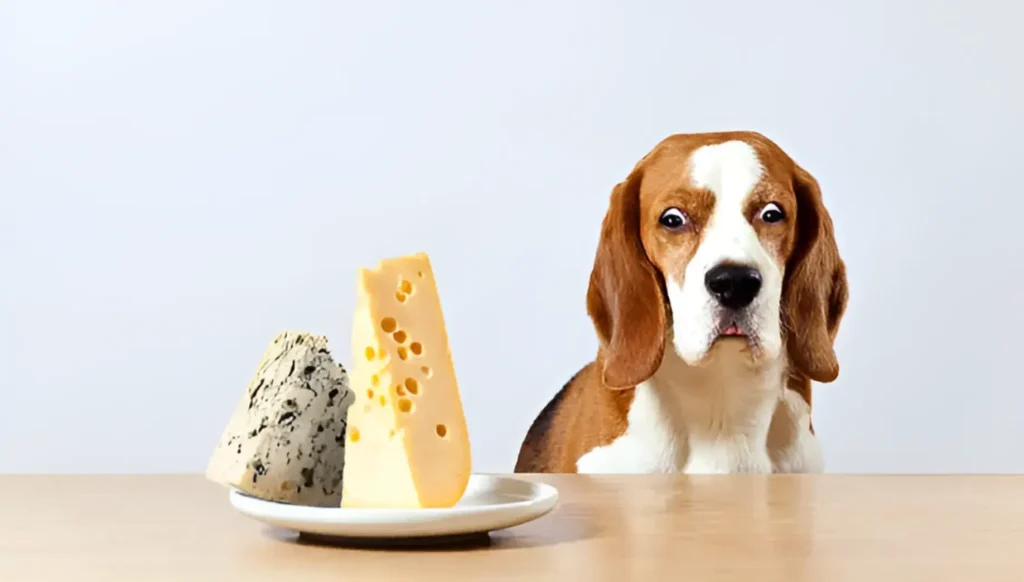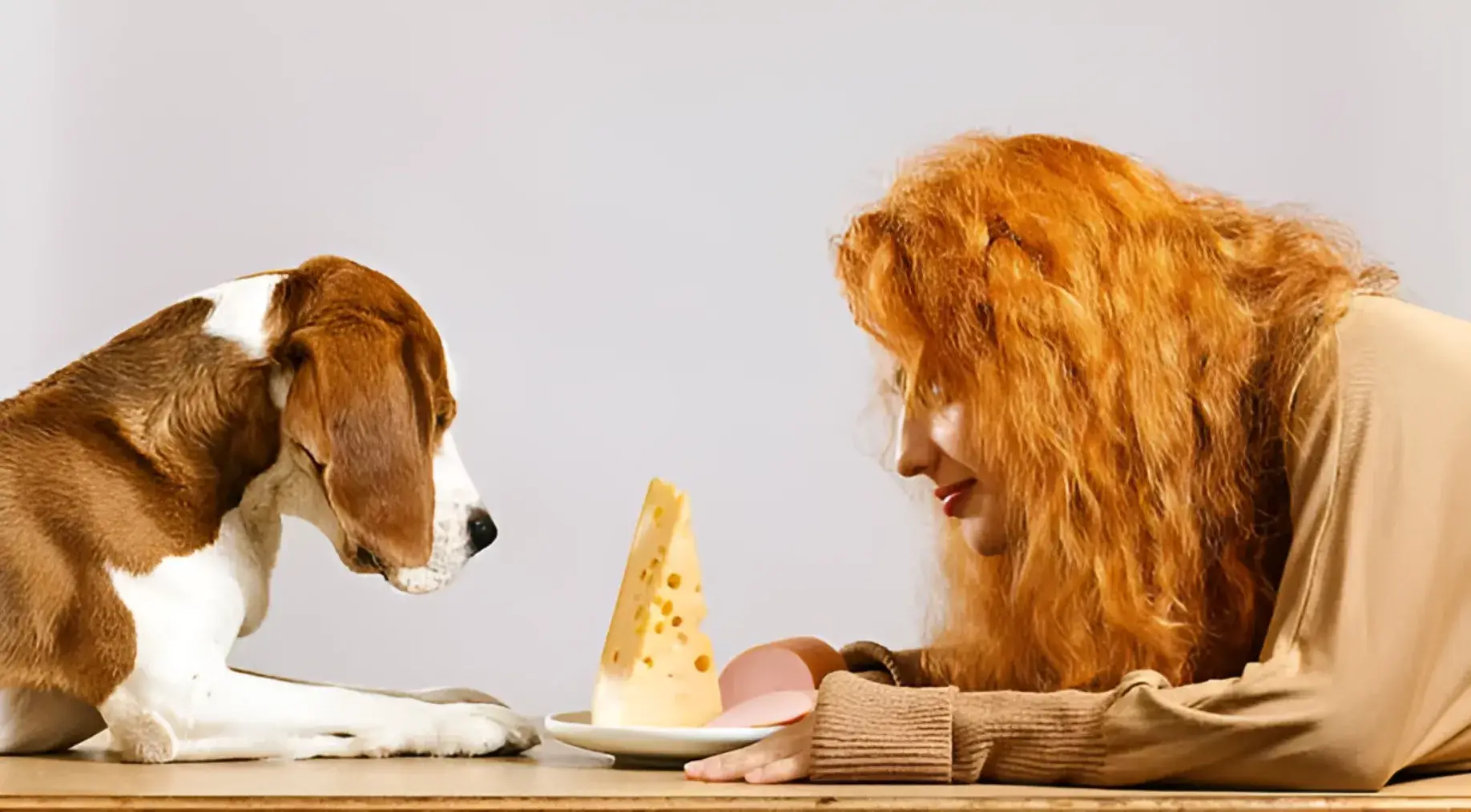Yes, dogs can enjoy small amounts of Colby Jack cheese as a special treat. However, it’s important to be aware of both the potential benefits and risks, especially if your dog has difficulty digesting dairy products.
What’s in Colby Jack Cheese?
Colby Jack is a semi-hard cheese known for its mild and slightly tangy flavor. Here’s the nutritional breakdown you should know about:
Calories and Fat: Colby Jack is a calorie-dense and relatively fatty food. Too much can contribute to weight problems for your dog.
Sodium: It contains sodium, which should be monitored if your dog has heart health concerns.
Lactose: Colby Jack contains lactose (milk sugar). Some dogs may be sensitive or intolerant to this.
Calcium: This cheese does offer calcium, a mineral important for healthy bones and teeth.
Lactose Intolerance: The Key Factor
Many dogs have some level of lactose intolerance. If your dog has this issue, eating Colby Jack could lead to:
- Gas
- Bloating
- Diarrhea
- Vomiting
Signs of Lactose Intolerance in Dogs
Keep an eye out for these signs after your dog consumes Colby Jack:
- Excessive flatulence or gas within a few hours
- Abdominal bloating or discomfort
- Diarrhea or loose stools 12-24 hours after consumption
- Vomiting, which can occur in severe cases
If your dog shows any of these symptoms, it’s best to withhold Colby Jack in the future and consult your veterinarian for guidance.
How Much Colby Jack is Safe for Dogs?

Moderation is key! Here’s a basic guideline:
- Small Dogs: A few small cubes (think the size of a pea) of Colby Jack as a treat.
- Medium/Large Dogs: A 1-inch cube a few times a week, broken into smaller pieces.
It’s always best to start with a tiny amount to see if your dog tolerates it. If they show any digestive upset, avoid Colby Jack in the future.
Better Cheese Choices for Your Dog
If you’re looking for dog-friendly cheeses, consider these lower-lactose and lower-fat options:
- Low-fat mozzarella (shredded or string cheese in small quantities)
- Cottage cheese (choose low-sodium varieties, especially for dogs with heart conditions)
- Swiss cheese (a small cube as an occasional treat)
- Cheddar cheese (in limited amounts due to its higher fat content)
Using Colby Jack for Training
Due to its enticing flavor and slightly crumbly texture, Colby Jack cheese can be a suitable high-value training treat, but with a caveat. Since it’s higher in fat, use it sparingly. Here’s how:
- Cut Colby Jack into tiny cubes no larger than a pea for training purposes.
- Limit the number of treats per session based on your dog’s size and training goals.
- Remember, healthy alternatives like freeze-dried meats or small pieces of cooked vegetables are generally better choices for frequent training rewards.
Fun Colby Jack Recipes for Dogs
Want to get creative with Colby Jack in a dog-safe way? Here are two simple recipe ideas:
Savory Cheese Dog Biscuits:
- Combine 1 cup whole wheat flour, ½ cup rolled oats, ½ cup shredded low-fat cheese (including a small amount of Colby Jack if desired), and 1 tablespoon melted unsalted butter.
- Add water, a tablespoon at a time, until a dough forms.
- Roll out dough and cut into shapes. Bake at 350°F (175°C) for 15-20 minutes or until golden brown.
- Let cool completely before offering to your dog.
Frozen Cheese-Stuffed Kongs:
- Fill a Kong toy with a small amount of mashed banana or unsweetened applesauce.
- Top with a tiny cube of Colby Jack cheese.
- Freeze for several hours.
- This is a great way to keep your dog entertained and cool on a hot day.
Situations When Cheese Is a Bad Idea

It’s best to completely avoid giving your dog cheese in the following cases:
Pancreatitis: Consuming cheese can worsen existing pancreatitis or even trigger this painful condition due to the high fat content.
Sensitive Stomach: If your dog has a history of digestive upset like gas, bloating, or diarrhea, cheese could further aggravate their system.
Suspected Dairy Issues: If your dog shows any signs of lactose intolerance or dairy allergy (digestive troubles, itchy skin), cheese is not a suitable treat.
Always Check with Your Vet
While a little Colby Jack cheese might be okay for some dogs, it’s always safest to get your veterinarian’s input before adding new foods to your pup’s diet. Why?
- Understanding Your Dog’s Needs: Your vet knows your dog’s health history, any allergies, or conditions that might make cheese a bad choice.
- Expert Portion Guidance: They can help you figure out how much (if any) Colby Jack is safe for your dog and how often it’s okay to offer it as a treat.
Think of Your Vet as a Team Player: They’re there to support you in making informed decisions about your dog’s well-being, including what yummy snacks they can enjoy!
My Dog Ate a Block of Colby Jack! What To Do
If your dog managed to scarf down a large amount of Colby Jack, stay calm and observe them closely. Here’s how to handle the situation:
Mild Symptoms: Keep an eye out for gas, bloating, or diarrhea. Temporarily withhold food and offer plenty of water. If things improve, slowly introduce a bland diet.
Severe Symptoms or Persistent Vomiting: Call your vet right away. Excessive cheese consumption could trigger pancreatitis, which requires medical attention.
Urgent Warning Signs: Contact your vet immediately if you notice lethargy, severe abdominal pain, or a hunched posture.
Conclusion
Colby Jack cheese can be an occasional yummy treat for dogs, but moderation is key. Be aware of portion sizes and watch for any signs of lactose intolerance. If you have concerns, safer cheese choices are available, and consulting your vet is always the wisest choice.
The photo featured below the post headline is Credit: igorr1/istockphoto
I hope you find this post helpful and informative. If Yes’ feel free to share it with your friends!
Frequently Asked Question
Is Colby Jack cheese bad for dogs?
Not inherently, but it can cause problems for lactose-intolerant dogs or if given in excess.
Can puppies eat Colby Jack cheese?
It’s best to avoid giving puppies cheese, as their digestive systems are still developing. Give them puppy-formulated foods and treats.
Are there any dog-specific Colby Jack treats?
While some dog treats might have cheese flavorings, it’s essential to read labels closely. Look for treats with minimal additives and preservatives. Homemade, dog-friendly recipes are often a healthier choice.
Can dogs eat shredded Colby Jack cheese?
Yes, dogs can eat shredded Colby Jack cheese, but the same rules apply. Focus on small amounts as a treat.
Can my dog have a little bit of Colby Jack cheese every day?
While a tiny bit every day might not cause immediate problems, it’s not recommended. Too much cheese can contribute to unhealthy weight gain. Reserve cheese treats for special occasions.
What kind of cheese is best for dogs?
Low-fat mozzarella, cottage cheese, and Swiss cheese are generally better choices for dogs due to their lower lactose and fat content.
Is Colby Jack cheese toxic to dogs?
Colby Jack itself isn’t toxic, but excessive consumption could make your dog unwell and, in rare cases, trigger pancreatitis.
Can Colby Jack cheese cause diarrhea in dogs?
Absolutely! This is a primary sign of lactose intolerance in dogs.
My dog accidentally ate Colby Jack cheese. Should I be worried?
Monitor for any digestive upset. Most dogs will be okay after eating a small amount, but if symptoms are severe or persist, contact your vet.
Are there alternatives to Colby Jack cheese for dogs?
Yes! Consider plain, lactose-free yogurt, small amounts of cooked chicken or fish, or even dog-friendly fruits and vegetables as treats.

